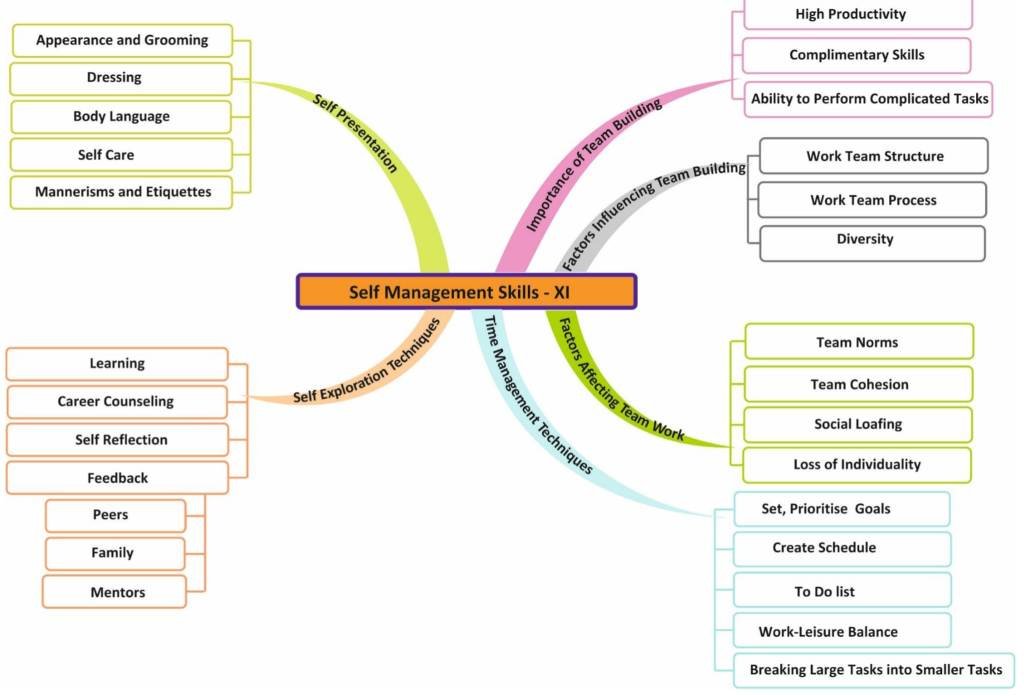Self Management Skills - Eesha, Hibachi, Rabiya (11 C)
Introduction:
The basic and important aspect of self – management is physical appearance, grooming, mannerisms and etiquettes of a person. This creates first image in the mind of people about others.
Self Management Skills:

Self-Exploration Techniques:
Self-exploration helps develop a clear understanding of self-interests, attitudes, skills, wants and needs, which guide you to choose your profession for life.
Following approaches may help people self explore.
Learning – Formal / Informal/ Self-directed learning leads to acquiring some skills. Out of the learnt skills some skills may be preferred skills, and may guide us shape our career.
Career Counsellor / computerized career information systems –Career counsellor and career information systems can help one with information on courses and the outcome of the courses.
Self-reflection/ Inquiry – This is a thoughtful process where people discover themselves through reflection on past experiences and patterns of their own behaviour.
Feedback – Peers, family and mentors provide us with genuine feedback which help us identify our hidden talents and strengths.
Team Work Skills:
Team refers to a group of people who have complementary skills and work towards a common goal. . Teams result in higher productivity. Teams are very useful in performing work that is complicated, complex, interrelated, and /or more voluminous than one person can handle.
Important factors that influence team building
Work Team Structure – It includes goals and objectives, operating guidelines, performance measures, and role specification.
Work Team Process – Work team competitiveness and cooperative behaviour need to be considered while building a team.
Diversity – Diversity influences team building as well as effectiveness. Diversity shall be ensured in gender, background and competencies. Diverse team also ensures creativity.
Factors influencing team work:
Following factors may influence team work.
Team norms – Team norms is the standards or rules that govern the performance of the group members. These rules can be written or unwritten.
Team cohesion – Bonding between the group members will come easily and together they contribute to the larger goal.
Social loafing – Social loafing or free riding occurs when one or more group members rely on the efforts of other group members and fail to contribute their time and effort. Identifying individual contribution can help nullify the effect of free riding.
Loss of individuality – It is a social process in which individual group members lose self-awareness and its accompanying sense of accountability, inhibition and responsibility for individual behaviour.
Time Management Strategies and Techniques:
Time management is the process of planning and exercising control of time spent on various activities to increase efficiency and effectiveness.
Following are the set of activities we need to take up for time management
Setting and prioritizing goals – We have option to steer our life or to let it run on its own. If we take charge of our life and our goals, we will be able to lead a meaningful life. For leading a successful life, we should create our targets and aims.
Creating a schedule – Creating a schedule instills discipline and punctuality and ensure efficient utilization of our time.
Making lists of tasks – This should be our first to-do thing every morning. List of tasks shall be prioritized for making our day worthwhile.
Balancing work and leisure – Work is important and equally important is leisure activity to help us unwind and recharge for the important tasks.
Breaking large tasks into smaller tasks – We should break large tasks into smaller ones. Smaller tasks can be finished in lesser time. When we will finish few small tasks, we feel motivated to complete others too.
Comments
Post a Comment